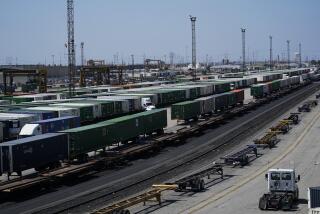Cities on 710 Push for Port Smog Clause
In another sign of discontent with the regionâs two seaports, communities along the 710 Freeway will tell government officials tonight that plans to expand the truck-clogged route should not move forward unless air pollution is reduced.
Representatives of cities in the area will present the new report just one day after Long Beach port commissioners voted 5 to 0 to rescind their support of a major expansion so that air contaminant issues can be studied more carefully.
Port commissioners on Wednesday directed staff to redo environmental documents for the project after air quality officials and environmental groups challenged them as insufficient.
Worries about air pollution also underlie the report that a committee will present today to freeway planners. The report says construction should not begin until pollution from the ports and the trucks and railroads serving it is reduced below 2002 levels. The committee is made up of members appointed by cities in the 710 corridor, including health experts, labor representatives and community activists.
Although the report is simply a recommendation, several representatives of the committee say they believe transportation and port planners must take it seriously in view of increasing concerns about port-related air pollution in southeastern Los Angeles County.
âI think it could be political suicide if they straight-out reject these conditions,â said Angelo Logan, a community activist from East Los Angeles who helped write the report.
Metropolitan Transportation Authority Chief Planning Officer James de la Loza said his agency was familiar with the report and did take the pollution issue seriously.
The MTA is spearheading the 710 expansion plans.
Gov. Arnold Schwarzenegger on Wednesday vetoed a bill that would have ordered the two ports to keep pollution at or below 2004 levels. The veto angered residents and activists, who charged that the governor sided with industry over neighborhoods near the ports.
The pollution debate is now shifting to the 710 Freeway, an 18-mile-long, 1950s-vintage highway that connects the ports with rail yards east of downtown Los Angeles. Big-rig trucks that jam the road are a major source of diesel fumes and other pollution, triggering widespread worries about health effects in cities from Long Beach to Commerce.
Current plans call for replacing the six- to eight-lane freeway with 10 lanes for both cars and trucks and an additional four lanes for trucks only. The project, which could cost $6 billion or more, is seen as essential to keep goods moving in and out of Southern California ports. No construction start date has been set.
The community advisory groupâs report will be presented to the so-called Oversight Policy Committee, made up of officials overseeing improvement plans for the 710, in a meeting at 6:30 tonight at the Carson Community Center. The freeway expansion project has been on hold since spring 2003, when public outcry over potential air pollution increases and home demolitions forced the MTA board to rethink its planning efforts. That in turn led to creation of a community panel that has assessed how an expanded freeway would affect area residents.
The result is a 38-page report supported by all 35 members of the panel. A separate panel of city engineers and other technical experts endorsed the report earlier this month, but the two representatives of the ports opposed it.
The report says that the health of area residents must be the most important priority in 710 planning, and recommends that officials develop an action plan to reduce air pollution along the route.
It also recommends levying fees on cargo containers to finance clean-air improvements; subjecting all trucks to federal, state and local regulations; and requiring the Alameda rail corridor to prepare a plan to switch to electric locomotives.
More to Read
Sign up for Essential California
The most important California stories and recommendations in your inbox every morning.
You may occasionally receive promotional content from the Los Angeles Times.



![[20060326 (LA/A20) -- STATING THE CASE: Marchers organized by unions, religious organizations and immigrants rights groups carry signs and chant in downtown L.A. "People are really upset that all the work they do, everything that they give to this nation, is ignored," said Angelica Salas of the Coalition of Humane Immigrant Rights. -- PHOTOGRAPHER: Photographs by Gina Ferazzi The Los Angeles Times] *** [Ferazzi, Gina -- - 109170.ME.0325.rights.12.GMF- Gina Ferazzi/Los Angeles Times - Thousands of protesters march to city hall in downtown Los Angeles Saturday, March 25, 2006. They are protesting against House-passed HR 4437, an anti-immigration bill that opponents say will criminalize millions of immigrant families and anyone who comes into contact with them.]](https://ca-times.brightspotcdn.com/dims4/default/34f403d/2147483647/strip/true/crop/1983x1322+109+0/resize/840x560!/quality/75/?url=https%3A%2F%2Fcalifornia-times-brightspot.s3.amazonaws.com%2Fzbk%2Fdamlat_images%2FLA%2FLA_PHOTO_ARCHIVE%2FSDOCS%2854%29%2Fkx3lslnc.JPG)






